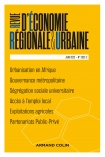
REVUE D'ÉCONOMIE RÉGIONALE ET URBAINE (2/2025)
Pour acheter ce numéro, contactez-nous
Recevez les numéros de l'année en cours et accédez à l'intégralité des articles en ligne.
Nous proposons la notion de « pénalité périphérique » pour désigner un effet négatif subi par un ménage du fait d’une localisation résidentielle à distance d’une métropole régionale. Sans ignorer d’autres domaines, nous nous focalisons sur les pénalités dans l’accès à l’emploi. Pour les mesurer, nous confrontons les apports de données observationnelles et expérimentales. Nous montrons que les pénalités périphériques combinent à la fois un effet de distance et un effet de localisation et qu’elles peuvent être alourdies lorsque le demandeur est d’origine ultra-périphérique ou étrangère. Au total, les ménages localisés en périphérie subissent de fortes pénalités dans l’accès à l’emploi, largement sous-estimées par la littérature spatialisée. Il nous semble que les crises des années 2000 n’ont ni amplifié, ni atténué ces pénalités mais que les politiques publiques ont un rôle éminent à jouer pour les compenser.
We propose the notion of "peripheral penalty" to designate a negative effect suffered by a household due to a residential location at a distance from a regional metropolis. This penalty associated with a place of residence on the periphery, at a distance from the urban center, is the symmetrical of the notion of agglomeration economy, used to qualify corporate earnings, and whose role is central to the new geographic economy. The issue of peripheral penalties is part of spatial economics. It can be extended to the notion of ultra-peripheral penalty, which can be applied to ultra-marine territories, and which is more akin to regional economics. Without ignoring other areas, we focus on penalties in access to employment. To measure them, we compare the contributions of observational and experimental data and draw on the body of research that has proposed a precise measurement of these penalties, particularly on French data. We show that peripheral penalties combine both a distance effect and a location effect, and that they can be increased when the applicant is of ultraperipheral or foreign origin. All in all, households located on the outskirts of regional metropolises suffer severe penalties in access to employment, largely underestimated by spatialized literature which focuses essentially on transport costs. It seems to us that the crises of the 2000s have neither amplified nor attenuated these penalties, but that public policies have an eminent role to play in offsetting them.

